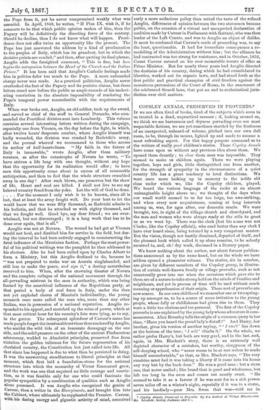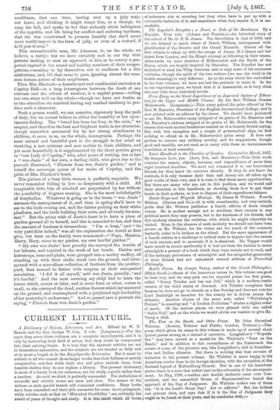COPSLEY ANNALS, PRESERVED IN PROVERBS.*
IF we are often tired of books, tired of the subjects which seem to us treated in a dead, unpractical manner ; if, looking around us, we think we see barrenness and dryness pervading even our most respectable fictions, we are yet sometimes startled by the freshness of an unexpected, unheard-of volume, pitched into our own dull room, to be, through its means, lighted up and made to assume a most refreshing aspect. For this happy purpose commend us to the writers of really good children's stories. These Copsley Annals have come upon us without any previous idea about them. We opened them drearily ; to close them soon was impossible. They seemed to make us children again. There we were playing together, boys and girls, little distinguished one from another, for the strength of sympathy in the circumstances of a quiet country life has a great tendency to level distinctions. We were once more looking up in memory to the noble old elms under which we, like the Copsley children, played. We heard the various language of the rooks at an almost unimaginable height above us ; we thought of the days when our small world seemed to us far too large, too awe-striking, and when every new acquaintance, coming at long intervals among us, was, for ages after, our domestic oracle. We were brought, too, in sight of the village church and churchyard, and the men and women who were always ready at the stile to greet us as we went by. There was the clerk (but his name was not Clarke, like the Copsley official), who read better than any clerk I have ever heard since, being tutored by a very competent master. But the vision, though not hastily dismissed, departed of itself, and the pleasant book which called it up alone remains, to be soberly recurred to, and, ohl dry work, discussed in a literary paper.
We know nothing about the author, nor about former publica- tions announced as by the same hand, but on the whole we have seldom opened a pleasanter volume. The stories, six in number, are given by different members of the Copsley group, in illustra- tion of certain well-known family or village proverbs, such as not unnaturally grow into use when the occasions which gave rise to them are of a nature to take strong hold on the minds of families and neighbours, and yet in process of time will be used without much meaning or apprehension of their origin. These sort of proverbs are now scarce. In our own childhood we remember one or two spring- ing up amongst us, to be a source of some irritation to the young people, whose folly or childishness had given rise to them. They were a little too obvious and too personal. The first of the Copsley proverbs is one explained by the young ladywhose adventure it com- memorates. Alice Beverley tells the origin of a common query in her time, "Have you heard the proud lady's distaff ?" And Harry, her brother, gives his version of another saying, " I can't' lies down at the bottom of the tree ; 'I will' climbs it." On the whole, we rather prefer Harry's, but both are very good, and in the last, and, again, in Mrs. Blackett's story, there is an extremely well depicted character of a mistaken, but worthy, clergyman of the self-denying school, who "never seems to be at rest unless he made himself uncomfortable," so that, as Mrs. Blackett says, " The very sunshine must feel it was taking a liberty if it came into his house any way but by the back door." He was a good man ; but a stern one, that never smiled ; like bread that is good and wholesome, but left too long in the oven and comes out mostly crust. " He seemed to take it as a favour if he was sent for to a sick person seven miles off on a winter's night, especially if it was in a storm, and his landlady—poor Mrs. Swan that was—told me in * Copley Annals, Preserved in Proverbs. By the Author of Village Missfonories do. Loudon: Seeley, Jackson, end C
confidence, that one time, having sent up a jelly with- out leave, and thinking it might tempt him, as a change, he
rang the bell, and spoke to her that seriously about indulgence of the appetite, and life being for conflict and enduring hardness, that she was constrained to promise humbly that she'd never more testify respect in the form of jelly, or even of a custard, if he'd pass it over."
This uncomfortable man, Mr. Adamson, is, on the whole, we believe, a rarity; but we have certainly met in our day with persons making so near an approach to him as to convey a per- petual reproof to the sound and healthy members of their congre- gations,—seeming to lay themselves out in readiness for a dire misfortune, and, till that came to pass, ignoring almost the com- mon human nature of their neighbours.
Then Mrs. Blackett—a housekeeper and confidential caretaker at Copeley Hall—in a long interregnum between the death of one mistress and the advent of another, is a capital person—telling her own story well on the whole—though we have our doubts as to the education she received having any marked tendency to pro- duce such a character.
Such a person would, we can conceive, rigorously keep the path of duty, but we cannot believe in either her humility or her spon- taneous feeling. The "bread has been too long in the oven," we suspect, and therefore the best and brightest traits in her character, though somewhat accounted for by her strong attachment to
children, do seem to us, on the whole, incongruous. Perhaps the
most natural and beautiful part is the struggle in her mind on receiving a new mistress and new mother to these children, and yet more beautifully is it supplemented by the short portion given to "our Lady of Copsley," who, after years of waiting, has at last a " wee Janie" of her own, a darling child, who gives rise to the proverb illustrated, " Flowers from wee Janie's garden," and is herself the sovereign queen of her realm of Copsley, and the pride of Mrs. Blackett's heart.
The picture of a busy little woman is perfectly exquisite. We never remember falling in love so desperately with a child. All imaginable little bits of mischief are perpetrated by her without
the possibility of disgrace ensuing. She is the most indefatigable of busybodies. Whatever is going on in the house " wee Janie"
assumes the management of it, and then in spring she'll have to see to the buds coming out, and the daisies putting on their white pinafores, and the birds building their nests, and all ready for sum- mer." But the prime wish of Janie's heart is to have a piece of
garden-ground all to herself, and this is conceded to her, and then the amount of business is tremendous. "I'm so busy," and " its
very particklar indeed," was all the explanation she would at first give, but later on the family were summoned—" Papa, Mamma, Harry, Mary, come to my garden, my own boo'ful garden !"
" My own wee Janie ! how proudly she surveyed the results of her labours, and rejoiced in the work of her hands. Daisies and buttercups, roses and pinks, were grouped into a motley medley, all standing up with their stalks stuck into the ground, and inter- spersed with a marvellous collection of feathers from the poultry- yard, that seemed to flutter with surprise at their unexpected association. I did it all myself,' said wee Janie, proudly, and it's boo'ful.' And the next morning my child had to learn the lesson which, sooner or later, and in some form or other, comes to us all, as she surveyed the dead, rootless flowers which lay scattered on the ground, and contemplated with a perplexed sigh the futility of her yesterday's endeavours." And so passed into a proverb the saying, " Flowers from wee Janie's garden."































 Previous page
Previous page